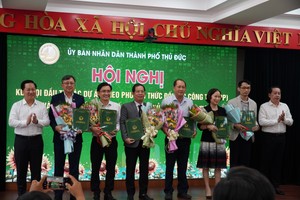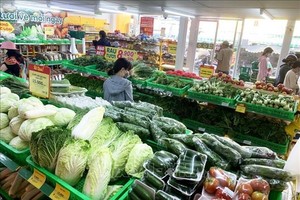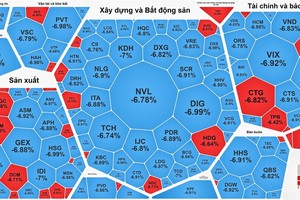Currently, there are six types of fresh fruits of Vietnam exported to the US, including dragon fruit, rambutan, mango, longan, star apple, and lychee.
Although the Covid-19 pandemic affected many import and export activities, more than 5,000 tons of fresh fruits exported to the US from the beginning of this year to the end of August, an insignificant decrease compared to that of more than 6,000 tons of fresh fruits in the same period last year.
With the plant quarantine expert of the US Animal and Plant Health Inspection Service(APHIS) returning to Vietnam from September 2, after completing medical quarantine procedures, he is now present at the Son Son Irradiation Center in Ho Chi Minh City and will help the quarantine of fresh fruit before exporting to be more easily and faster. Traditionally, from now to the end of the year, the US demand for imported fresh fruits increases sharply.
Although the Covid-19 pandemic affected many import and export activities, more than 5,000 tons of fresh fruits exported to the US from the beginning of this year to the end of August, an insignificant decrease compared to that of more than 6,000 tons of fresh fruits in the same period last year.
With the plant quarantine expert of the US Animal and Plant Health Inspection Service(APHIS) returning to Vietnam from September 2, after completing medical quarantine procedures, he is now present at the Son Son Irradiation Center in Ho Chi Minh City and will help the quarantine of fresh fruit before exporting to be more easily and faster. Traditionally, from now to the end of the year, the US demand for imported fresh fruits increases sharply.
 Quarantine expert Timothy Westbrook (APHIS) at Son Son Irradiation Center. (Photo: SGGP)
Quarantine expert Timothy Westbrook (APHIS) at Son Son Irradiation Center. (Photo: SGGP)
Explaining to the press, Mr. Hoang Trung said that at present, Son Son Irradiation Center is the only facility in Vietnam recognized by the US to have qualified for the handling of fruits. An irradiation center has been built in Hanoi, and it is in the process of being tested to receive recognization by the US. The Son Son Irradiation Center handles 100 tons of fruits a day. Meanwhile, it is currently only using about 30 percent of its capacity every day, so it does not affect the fruit export progress.
Furthermore, the quarantine of fresh fruits for export depends on the requirements of each country. The US requires fruits to be irradiated, while Japan, South Korea, and New Zealand require the application of hot water treatment. Therefore, the investment in the construction of a fruit treatment plant depends on the market demand and investors' calculations.
Furthermore, the quarantine of fresh fruits for export depends on the requirements of each country. The US requires fruits to be irradiated, while Japan, South Korea, and New Zealand require the application of hot water treatment. Therefore, the investment in the construction of a fruit treatment plant depends on the market demand and investors' calculations.
























